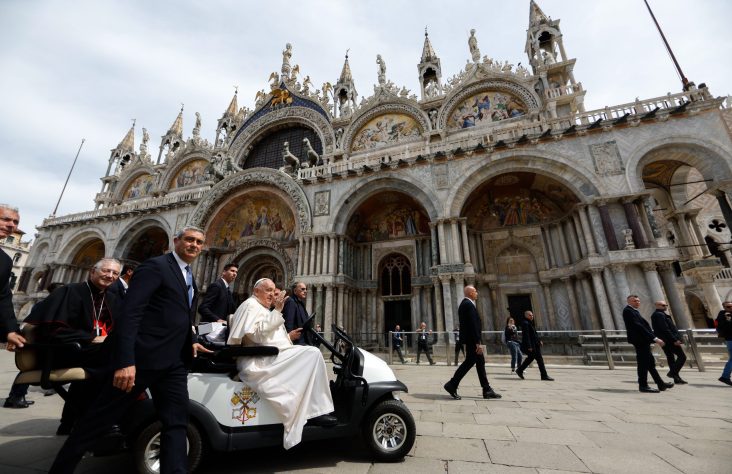November 21, 2023 // Perspective
If There Is No Patron Saint for Your Cause, Become One
Recently, my friend David retired after a long career in radio. I had many great conversations with him through the years during the morning show on Portland’s Catholic radio station, chatting on-air every few weeks about saints and feast days, and occasionally a little bit about Notre Dame football. So naturally, on the occasion of his retirement, David asked me to talk about the patron saint of retirees.
This proved to be a short conversation because, as it turns out, there is not an official patron saint devoted to the process of retirement. The Church calls upon many saints who are associated with particular conditions and challenges faced by the elderly, but there isn’t a heavenly patron universally called upon at the end of one’s career.
Why, one wonders, is there a dearth of patrons for retired people? In one sense, it has to do with how patron saints become associated with the task, career, or place of which they have become the patron. St. Nicholas provided bags of gold to serve as dowries for three poor young ladies, thus becoming the patron saint of gift giving and of children. St. Thomas More was a judge and statesman, and is therefore invoked by lawyers. Bishop Luers placed our diocese under the patronage of the Immaculate Conception, in honor of the dogma that had been proclaimed just five years before the cornerstone of the new cathedral in Fort Wayne was laid.
One notable patron of the elderly, St. Jeanne Jugan (d. 1879), the French founder of the Little Sisters of the Poor, devoted her life and ministry to caring for the “poorest of the poor,” the elderly who had no one to care for them. And St. Anthony of Padua (d. 1231) is also lauded as a patron of the elderly, in honor of the charity that he showed toward those on the margins of society. Of course, St. Anthony also has many other patronage responsibilities, not the least of which is finding lost items, so his heavenly workload is pretty busy.
Another name that came up in my patron saint research is St. Gummarus, a Belgian nobleman in the court of King Pepin the Younger, the father of Charlemagne. Gummarus, who was praised by his peers as a holy and temperate man, entered into a disastrous marriage to a noblewoman named Guinmarie, whose haughty personality proved to be irreconcilable with that of her meek husband. After years of domestic difficulties, Gummarus determined that for the sake of his own soul, he had to separate from his wife, and so he retired from his courtly responsibilities to become a hermit, dying peacefully in 774. History doesn’t relate how Guinmarie spent the rest of her life, but one can safely imagine that the hermit Gummarus devoted many hours of intercessory prayer for his estranged wife.
It’s understandable if a newly retired person, perhaps, doesn’t want to immediately begin to dwell upon the health challenges that come with old age, nor look to a hermit who left his wife for particular intercession, saintly though Gummarus may have been.
Accordingly, many retirees continue to call upon the patron saints that they knew during their careers. Firefighters who’ve put on their gear for the last time continue to invoke St. Florian, while retired doctors look to St. Luke, the beloved physician, for intercession. I suggested in my final radio chat with my retiring friend David that he could continue to call upon St. Gabriel, the angel who visited Mary at the Annunciation and, thus, is honored as patron of broadcasters. And some day long in the future, after I’ve sent my last column to my editor, I’ll forever raise a toast to St. Frances de Sales, patron of Catholic journalists.
But when you have a difficult time finding an official patron saint to call upon for a particular career, place, or interest, I’d like you to consider another possibility: become a saint yourself.
In the words of French Catholic novelist Léon Bloy, “The only real sadness, the only real failure, the only great tragedy in life, is not to become a saint.” As St. Paul reminds us in nearly every one of his letters, we who are baptized into Jesus Christ are already part of the Communion of Saints. The challenge is to keep on being saints.
Remaining a saint is not a question of willpower but an issue of cooperation, of saying “yes” to God’s invitation to everyday holiness. Through the sacraments, especially the Eucharist and reconciliation, He offers us the grace that we need to reach that lofty goal, to bring to completion the good work that He has begun in us. The more we rely on God’s grace, the more we see it active in our lives, and this encourages us to go even deeper. As the Catechism of the Catholic Church teaches, “reflection on God’s blessings in our life and in the lives of the saints offers us a guarantee that grace is at work in us and spurs us on to an ever greater faith” (No. 2005).
So I ask you, fellow saint, what will future Catholics invite you to intercede for?
Ken Hallenius is a syndicated radio host and podcaster living in South Bend.
The best news. Delivered to your inbox.
Subscribe to our mailing list today.






